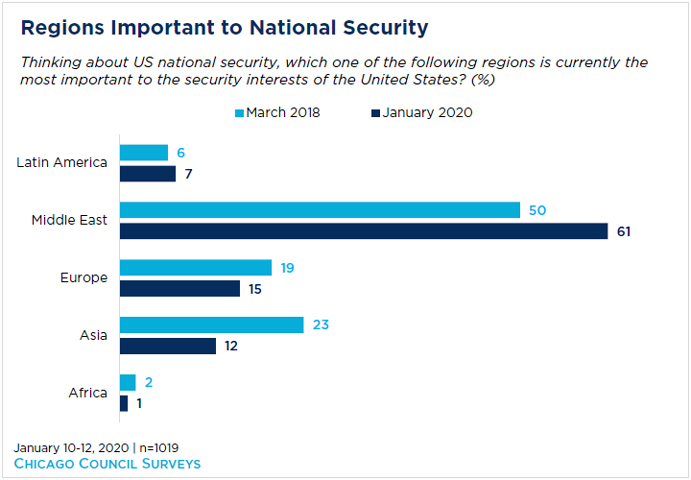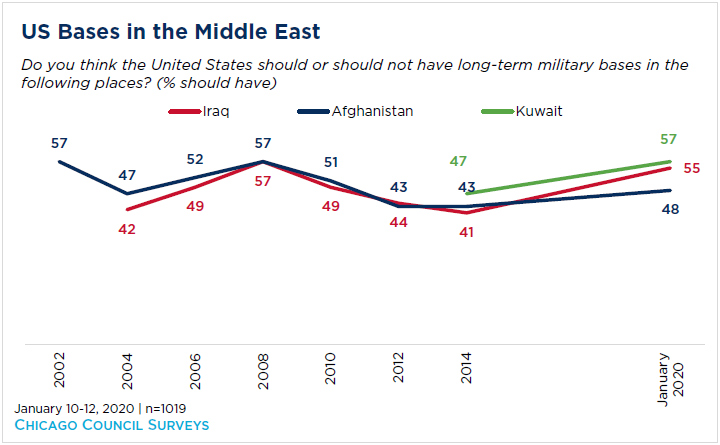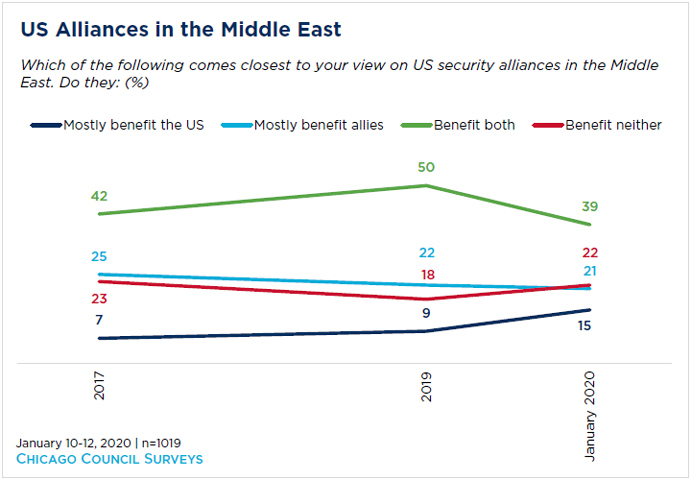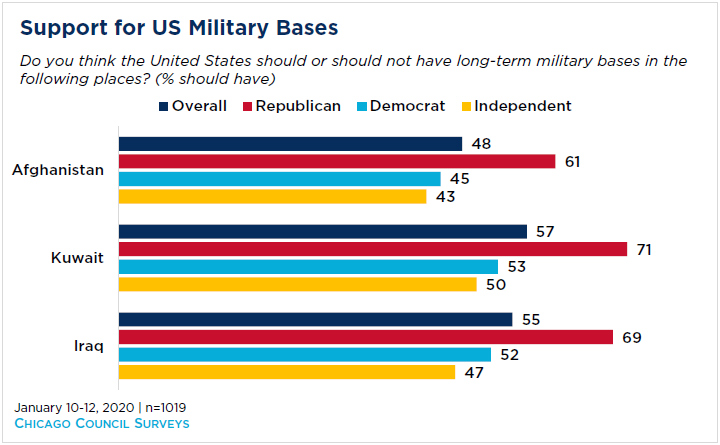A Chicago Council survey completed January 10–12 shows that as tensions with Iran have risen, Americans see an increased need to keep watch over the Middle East by maintaining a troop presence there.
Introduction
"As we defend American lives, we are working to end America's wars in the Middle East," President Donald Trump declared at State of the Union on February 4. Democratic presidential candidates, too, have made halting so-called "endless wars" a key talking point, ranging from cutting back troop levels to withdrawing the US military presence in the Middle East. A Chicago Council survey completed January 10–12 shows that as tensions with Iran have risen, Americans see an increased need to keep watch over the Middle East by maintaining a troop presence there.
Key Findings
- A majority of Americans say the US military presence in the Middle East should be maintained (45%) or increased (29%). Just 24 percent think it should be decreased.
- A majority support long-term military bases in Iraq (55%, up from 41% in 2014) and Kuwait (57%, up from 47% in 2014). Nearly half favor keeping bases in Afghanistan (48%, up from 43% in 2014).
- A combined majority (54%) say alliances in the Middle East benefit both Middle East partners and the United States or mostly benefit the United States.
Americans Question Value of Wars; Mideast Still Most Important to US Security
During the January 14 Democratic presidential primary debate in Des Moines, moderators pressed the candidates for their positions on troop levels in the Middle East. Joe Biden said he would "leave troops in the Middle East in terms of patrolling the [Persian] Gulf" and keep a "small number" to confront the Islamic State. Amy Klobuchar said she would keep some troops in the region but "not in the level that Donald Trump is taking us right now." Elizabeth Warren argued, "We should stop asking our military to solve problems that cannot be solved militarily," adding that "we need to get our combat troops out."
Bernie Sanders invoked the refrain of avoiding "endless wars" and, at the opening of the debate, referred to the Iraq War as "the worst foreign policy blunder in the modern history of this country." Americans seem to agree that the war in Iraq has not been a success. Two-thirds of Americans now say it was not worth fighting (67%), up from 27% in 2003 at the outset of the war. One-third think it was worth fighting (30%), down from 70%. Views of the war in Iraq have been consistently negative since 2005.
Public evaluations of the war in Afghanistan are similarly negative, with two-thirds saying that the war was not worth fighting and one-third saying it was. An October 2019 University of Maryland survey found that more Americans tended to say US military involvement in Afghanistan had been unsuccessful (33%) than successful (19%), but a plurality said it had been neither (38%).
Despite these views, Americans still see the Middle East as the region most important to US security interests (61%), even more so than when last asked in 2018 (when 50% named the Middle East). No other region comes close, with just 15 percent of Americans saying Europe is the most important, 12 percent naming Asia, and just 7 percent responding with Latin America. Public concern about the Middle East is likely related to American perceptions of top security threats, which include the possibility of a violent Islamic extremist group carrying out a terrorist attack in the United States (64%) and Iran’s nuclear program (61%).

Majorities Say US Military Presence in Mideast Should Be Maintained or Increased
In addition to seeing the Middle East as the most important region for US security interests, a majority of Americans say the US military presence in the Middle East should be either maintained (45%) or increased (29%). Just 24 percent think it should be decreased, similar to Chicago Council surveys dating back to 2015. Moreover, a majority believe the United States should have long-term military bases in Iraq (55%), the highest level since 2008 (when 57% agreed). A majority also favor long-term basing in Kuwait (57%), up ten percentage points from 2014. The public is evenly divided on whether the United States should have long-term bases in Afghanistan (48% should, 49% should not), though this is the highest level of support for basing in that country since 2010.

The United States has had some controversial disagreements with allies in the Middle East over the past year. In October, the United States announced it was withdrawing troops from northern Syria. Soon after Turkish President Recep Erdogan launched a military campaign against the Kurds, despite Kurdish assistance in fighting the Islamic State. US-Saudi ties have been strained following the killing of Washington Post columnist Jamal Khashoggi inside the Saudi consulate in Istanbul in October 2018. And amid escalating tensions between the United States and Iran following the killing of Iranian General Qasem Soleimani, the Iraqi Parliament voted in early January 2020 to expel American troops from the country.
Undoubtedly these moves have raised questions about the benefits of US alliances in the region. For their part, Americans tend to say the US alliances in the Middle East mostly benefit both the United States and its allies (39%) or mostly the United States (15%). Adding them together, slightly fewer now (54%) than in 2019 (59%) see a positive benefit for the United States, though this level is still higher than the combined percentage in 2017 (48%).

Bipartisan Agreement on Troop Presence
Majorities of Republicans (67%), Democrats (64%), and Independents (55%) see the Middle East as the most important region for US security. There is also general bipartisan support for maintaining or increasing the US military presence in the Middle East, though Republicans (39%) are more likely than Democrats (29%) or Independents (22%) to favor increasing the US presence in the region.
Republicans are far more supportive of long-term US military bases in Iraq, Kuwait, and Afghanistan than are Democrats or Independents. In the case of Afghanistan, majorities of Democrats (53%) and Independents (53%) oppose the United States maintaining bases, while six in ten Republicans (61%) support them. Republicans are also more likely to see the wars in Iraq (51%) and Afghanistan (50%) as having been worth fighting, while large majorities of Democrats and Independents say they have not been worth fighting.

Methodology
The analysis in this report is based on data from a 2020 Chicago Council survey of the American public on foreign policy, a project of the Lester Crown Center on US Foreign Policy. This omnibus survey was conducted January 10 to 12, 2020, by Ipsos using its large-scale online research panel, KnowledgePanel, among a weighted national sample of 1,019 adults 18 or older living in all 50 US states and the District of Columbia. The margin of sampling error for the full sample is ±3. The margin of error is higher for partisan subgroups.




